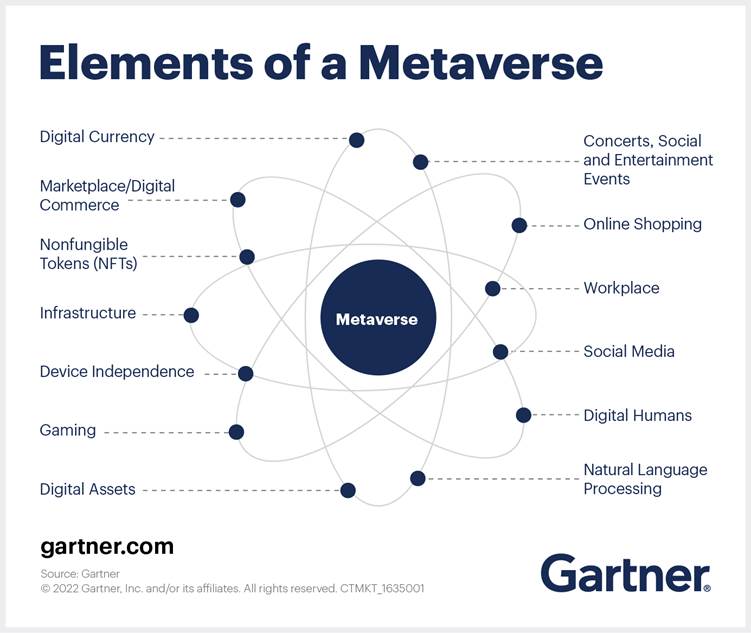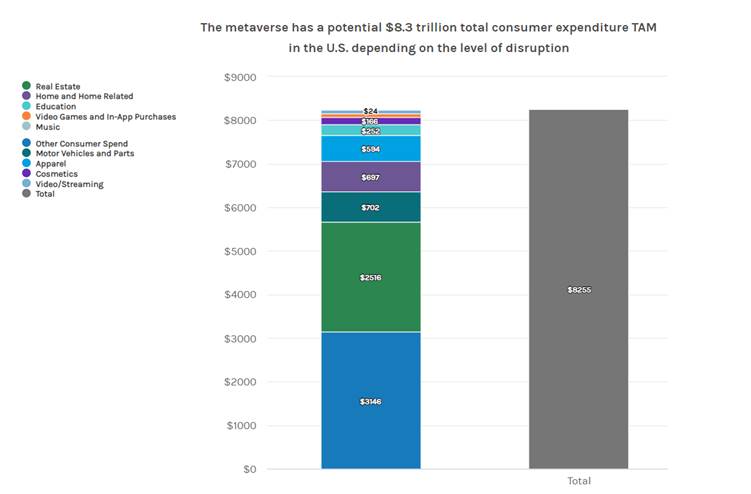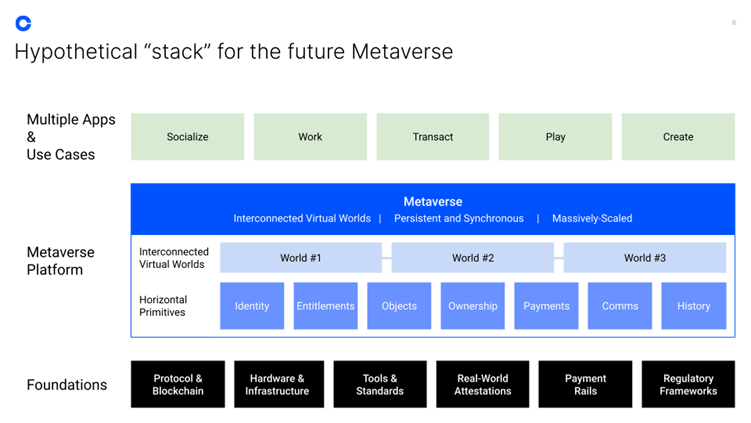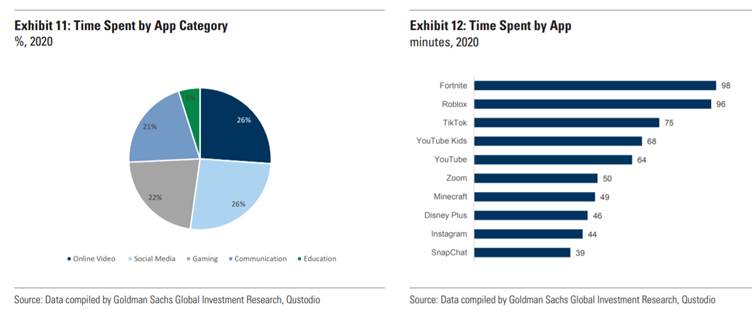Introduction
The Metaverse has been hard for investors to
avoid in the last 12 months. It has been variously described as everything from
the evolution of virtual reality (VR) to
the next iteration of the internet.
That is one way to think about it, that of a
coming technological overhaul which will move users from read-only static
webpages (Web1) to interactive read + write and social networks (Web2) to read +
write + own (Web3).
The Metaverse is one specific evolution of
Web3. When 'complete', it will involve a series of decentralised interconnected
and increasingly realistic 3D virtual worlds, each with their own functional
online economy.
A January 2022 report by Gartner suggests that by 2026, 25% of people globally will
spend at least one hour per day in the Metaverse for work, shopping, education,
social media and entertainment.

The term 'Metaverse' was coined 30 years ago
by Neal Stephenson in his 1992 novel Snow Crash. The author foretold a
future where users connected to a VR space using the internet and interacted
with objects and other human beings through augmented reality (AR). Players
were represented by avatars, with computer programs ('software agents') acting
on their behalf.
It was prophetic, but like most predictions,
only partially correct. We can consider the software agents of this fiction
like the blockchain-based smart contracts of today: automated pieces of code
that carry out specific pre-defined actions in law, finance or to ascribe
rights to digital property (NFTs).
VR and AR are not new technologies but their
usage is growing and their influence is starting to bleed into everyday life.
Facebook's October 2021 name-change to Meta, and its $10bn commitment to developing the Metaverse,
was just the crest of a wave. In February 2022 Nigel Bolton, co-head of
equities at $10 trillion asset manager Blackrock, predicted "game changer" products including AR glasses and 5G technology
would fuel huge Metaverse growth in 2022, not only for tech firms but also
consumer, advertising and leisure stocks.
The world's most recognised investment banks
have already scoped out the total addressable market. Morgan Stanley sees
Metaverse-related businesses combined creating an $8.3 trillion
opportunity in the United States alone.
Goldman Sachs sees an ultimate valuation of more than $12 trillion globally.
The pace of change may be even more rapid
than that. Given that digital asset markets have grown from a $10 billion
industry to one worth $2 trillion in less than 6 years, such predictions should not be quickly dismissed.
Key features
The key verticals involved in the Metaverse
include cutting-edge technologies in online gaming, virtual reality, 3D
graphics engines, high-speed wireless communications, video streaming and more,
but ultimately Metaverse development is likely to affect almost every industry
in the future and stretch far beyond its first major application in gaming.
Morgan Stanley senior internet analyst Brian
Nowak writes:
While the market is still debating how long the metaverse
will take to develop and what it will feature, we think the metaverse is most
likely going to be a next-generation social media, streaming, gaming and
shopping platform. In some ways we already live in a metaverse, as shown
by the 11 billion days per year spent by daily active users in the US consuming
digital media...that time could move to the metaverse.
Other predictions from Morgan Stanley are
that the Metaverse market could extend as far as enterprise applications for
real estate, automotive and education sectors, alongside consumer verticals in
video streaming, music and gaming.
 Source: https://www.morganstanley.com/ideas/global-stock-trends-2022
Source: https://www.morganstanley.com/ideas/global-stock-trends-2022
As digital asset exchange Coinbase
(NASDAQ:COIN) noted in its own investigation: the hypothetical tech stack of the Metaverse will include
persistent, synchronous and mass-scale virtual worlds upon which user will have
the ability to socialise, work, transact and create.
 Source: https://blog.coinbase.com/how-coinbase-thinks-about-the-metaverse-16d8070f4841
Source: https://blog.coinbase.com/how-coinbase-thinks-about-the-metaverse-16d8070f4841
VR/AR/MR
One of the cornerstones of the Metaverse is
VR (virtual reality) and its associated technologies AR (augmented reality) and
MR (mixed reality). The terminology has not yet been rigorously defined, but
the key concepts are that VR immerses people in 3D virtual environments, while
AR/XR/MR takes computer-generated images and overlays them on our view of the
world.
Nintendo (TYO:7974)
produced the first globally successful mass-market mobile gaming application of
AR/XR with 2016's Pokemon Go. Using GPS-enabled mobile phones, players located,
captured, and battled with virtual creatures. So immersive was the experience
that huge crowds of players formed in the locations where these digital
monsters appeared, for example in Taipei where thousands of
gamers descended on a particular street where
a 'rare' Pokemon was located. This cultural phenomenon peaked at 233 million
players in 2016 and while users now sit around 150 million, the game still
generated its highest ever
revenue of $1.2bn in 2020.
Microsoft
(NASDAQ:MSFT) moved into enterprise MR with its Hololens project in 2015. More
recently its January 2022 all-cash $68.7bn deal to buy gaming company Activision Blizzard was to "accelerate
the growth in Microsoft's gaming business and [to] provide building blocks for
the metaverse."
Apple
(NASDAQ:AAPL) is reportedly seeking to launch an enterprise-focused mixed-reality headset as soon as the end
of Q2 2022, featuring dual 8K displays and more than a dozen motion-tracking
sensors.
Meta Platforms (NASDAQ:FB) is undoubtedly the market leader in retail VR. By April 2021, its Oculus Quest 2 VR headset passed the
milestone of selling more total units than all other Oculus headsets combined.
Speaking to Bloomberg, the VP of Reality Labs Andrew Bosworth said the sales were
a tremendous indicator that we are now at that point where we have broken through
from the early adopter crowd to an increasingly mainstream crowd.
As the New York Times reported in January 2022:
Of the more than 3,000 open jobs listed on
Meta's website, more than 24% are for roles in augmented or virtual reality.
One job listed for a 'gameplay engineering manager' for Horizon, the company's
free virtual reality game, said the candidate's responsibilities would include
imagining new ways to experience concerts and conventions.
With the mapping ability of Google Earth
extending from the deserts of the Kalahari to the mountains of Bali, VR users
today can visit almost every location on the planet in 3D from the comfort of
their sofa. Both this, and the freedom of movement constraints imposed by the
Covid pandemic have opened the door to a very large potential market
opportunity.
Why sell just 3,000 physical seats to a live
concert or sporting event when the same 3D audio and visual experience can be
ported to VR and sold to 300,000? Or 3 million?
On the enterprise side of the AR market,
leaders are likely to include companies such as PTC Inc (NASDAQ:PTC),
which focuses on industrial
workforces collaborating remotely.
Roblox, Snap, Meta to lead
Meta, along with Roblox (NYSE:RBLX) and
Snap (NYSE:SNAP) will be the early winners of the retail Metaverse
economy, according to Goldman Sachs.
Snap is at the forefront (and an emerging
industry leader) with respect to the rise of augmented reality, as management
has prioritized investments in the development and adoption of AR
technologies/use cases, their late-2021 report reads.
Snap has 200,000 Lens creators and developers
with use cases spanning taking spatial measurements, new forms of storytelling
for entertainment and shopping (for example trying on shoes in AR and
purchasing directly).
Epic Games' Fortnite and Roblox lead social
gaming metrics, with users spending on average more than an hour and a half on
each multiplayer open-world game in 2020, "signalling the value the younger
generation place on social elements and virtual worlds within gaming".

As one of the world's most popular gaming
platforms, Roblox also benefits from its large creator economy with over 50
million daily active users and 200 million monthly active users, Goldman notes.
Roblox monetises its user base through the sale of its virtual currency, Robux,
which can be used to enhance game experiences, customise a players avatar, or
acquire development resources. The platform includes content developed by
individuals alongside film and TV studios like Warner Bros and Netflix, game
studios and external music artists.
NFTs: Cross-platform digital scarcity
Non-fungible tokens (NFTs) are undoubtedly one
of the first mainstream mass-market applications of blockchain technology, and
the picture has shifted from profile pictures of apes and cats into digital
artwork and beyond. ETC Group research shows NFT sales growth jumped 15,000% between 2020 and 2021.
So while traditionally-minded businesses from Samsung (KRX:005930) to PWC's Hong Kong arm are each buying up NFT land and opening stores in
metaverse-focused blockchain projects, it is no wonder that
Gucci, Burberry (LSE:BRBY), Gap (NYSE:GPS), Nike (NYSE:NKE) — with its December
2021 buyout of NFT fashion and collectibles startup RTFKT — and any major
multinational fashion brand investors care to name have spotted an opportunity
in creating and selling exclusive digital goods.
This growing trend proves that digital
scarcity programmatically controlled by code, as with Bitcoin and NFTs, are
just as desirable as physical scarcity, whether by price or by the availability
of raw materials. To dismiss the opportunity out of hand is to dismiss a
fundamental part of human nature: people want to own things that others can't.
Some exclusive digital products have even
sold for higher prices than their physical counterparts. In June 2021 a Gucci
'Queen Bee Dionysus' bag listed on the Roblox marketplace reached $4,115, 21% more than the cost of a physical bag at $3,400.
Regulation
Potential regulation of the metaverse is at
an early stage but could encompass everything from personal digital identity to
payments and video streaming to property rights.
Meta has already rowed back its attempts to
control the digital currency of the metaverse after hitting regulatory
barriers. Its 2019-introduced Libra project, later renamed to Diem, was shelved
in February 2022 and its assets sold to Silvergate Bank.
And as Osborne Clarke partner Felix Hilgert cites:
Where a metaverse includes live content and
streaming...providers may fall within the purview of media regulation with which
game companies and social networks have not traditionally been concerned.
Core regulation in this field includes the EU Audiovisual Media Services
Directive (AVMSD), and online streams may require licences depending on which
country's participants view them.
On 8 February 2022 the European Union head of
antitrust, Margrethe Vestager, said that officials in the EU should learn more
about the metaverse before seeking to impose regulations. As quoted by Reuters, the European Commissioner for Competition explained that the
metaverse was here already, adding:
Of course we start analysing what will be
the role for a regulator, what is the role for our legislature. That move has
in turn triggered concerns about possible dominance [of Meta Platforms].
Everything we do must be fact-based...we need to understand it before we can
decide what actions would be appropriate.
Outlook
It may seem today that the dominance of the
internet was a foregone conclusion. After all, everything from our phones to
our watches and even new washing machines are smart, WiFi-enabled, and
interconnected. But at least five years after the TCP/IP protocol that allowed
computers on the same network to share data was created, it remained a niche
invention popular only with researchers and academics.
By the same token, what consists of investing
in the 'metaverse' may change quite radically over the next decade.
Cutting-edge and misunderstood technologies may become mainstream,
billion-dollar industries, just as with cryptographically-secure
blockchain-powered NFTs.
And while fictional visions of the Metaverse may take decades to become reality, the elements that power such a future are already here: where working, shopping and social media shifts from behind a phone or laptop screen into a VR/MR space, where users actually own their customisable digital identity through NFTs, can port them from one currently siloed part of the net to another, and pay for goods using digital assets.
The conclusion? The smart money believes that
a multi-trillion dollar investment opportunity is ahead.
Important Information
This publication constitutes a marketing communication and is provided for informational purposes only. It does not constitute investment advice, a personal recommendation, or an offer or solicitation to buy or sell any financial instrument.
This document (which may take the form of a presentation, press release, social media post, blog article, broadcast communication or similar instrument – collectively referred to as a “Document”) is issued by Bitwise Europe GmbH (“BEU” or the “Issuer”) and has been prepared in accordance with applicable laws and regulations, including those relating to financial promotions.
Bitwise Europe GmbH, incorporated under the laws of Germany, is the issuer of the Exchange Traded Products (“ETPs”) referenced in this Document under a base prospectus and the applicable final terms, as supplemented from time to time, approved by the German Federal Financial Supervisory Authority (BaFin). The approval of the prospectus by BaFin relates solely to the completeness, coherence and comprehensibility of the prospectus in accordance with the Prospectus Regulation and does not constitute an endorsement, recommendation or assessment of the merits of the products.
The market analyses, views and scenarios presented reflect the assessment as of the date of publication and are based on information considered reliable. However, no representation or warranty is made as to their accuracy or completeness. Forward-looking statements involve risks and uncertainties and are not guarantees of future performance. Past performance is not a reliable indicator of future results.
Capital at risk. Cryptoassets are highly volatile and involve a high degree of risk. The value of investments in cryptoassets and crypto-linked ETPs may fluctuate significantly, and investors may lose part or all of their invested capital. No capital protection or guaranteed compensation mechanism applies in respect of market losses.
Any investment decision should be made solely on the basis of the relevant base prospectus, the applicable final terms and the key information document, in particular the section entitled “Risk Warning”. The base prospectus, final terms and additional risk information are available at: www.bitwiseinvestments.eu
Access to certain documents may require self-certification regarding your jurisdiction and investor status and may be subject to additional disclaimers and important information.
For further details, please refer to the full disclaimer available at: www.bitwiseinvestments.eu/disclaimer
